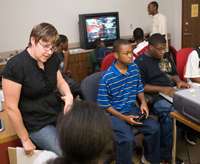Can Video Game Testing Spark Interest in Computing Among Black Youth?

Walk into almost any household that includes teenage boys and you'll find one or more video game consoles. Walk into that household past 10PM and you’re likely to find one or more teenage boys playing those video games. Walk into the parents’ bedroom, wake them up and then ask them what they think of their sons playing video games, and most likely they'll tell you it’s a waste of time - before they kick you out of their house. But is it truly a waste of time?
Betsy DiSalvo, doctoral candidate in the College of Computing at Georgia Tech, has a hunch that she can use their interest in video games to spur an interest computer science. And since African American males are under-represented not only in the computer industry, but also graduate schools, she and her colleagues have started a game testing group known as Glitch that introduces teenaged African American boys to the gaming industry as game testers for companies such as Electronic Arts, Game Tap and Cartoon Network. They’re finding that more than half of the game testers are now interested in furthering their education in computer science. DiSalvo is presenting her findings next week at the Digital Games Research Association (DiGRA) conference in London.
"Research tells us that African American males graduate from college at a lower rate than African American females. We also know that these same youth play video games at a higher rate than white males, so we wondered if we could use this interest in video games that they already have to increase their interest in computer science,” said DiSalvo.
Along with researchers from Tech and Morehouse College, DiSalvo introduced a group of 12 students aged 16-17 to game testing, giving them experience in working in the gaming industry for about 20 hours per week. In addition, the students learned programming skills using Alice, a drag and drop programming language. They also learned how to use Jython to manipulate images in a media computation workshop.
"We found these students’ play practices were very different from those of white youth,” said DiSalvo. “They began playing games at a younger age, they tend to play more often with parents or other family members, they prefer to play competitively with others in the room rather than online, they consider games as an extension of competitive sports and they tend not use cheats, hacks or gaming guides.”
What DiSalvo saw jibes with current research that shows that many young African American males don’t look at games as computation, or something that can be manipulated. Yet many people who go on to have careers in computing say that modifying existing programs, or creating hacks, was how they initially got into the field.
After learning how to game test from Electronic Arts, the students got first-hand experience with computer bugs and helping create games by spending six weeks testing a preproduction site for GameTap. In all they logged close to 1,000 bugs and conducted tests for the sites more than 1,000 games.
They also spent two weeks testing Cartoon Network’s Fusion Fall and Good Egg’s Elf Island. In addition they spent a week testing Polyghost, an iPhone application for Last Legion Games.
"It is a childhood dream job, playing games all day, but you learn it is a lot more than that,” said one of the game testers known as Spock to protect his privacy. “But you know it has been great here and I really think that computer science is something I am looking forward to.”
All in all, DiSalvo is pleased with what the program has been able to teach so far.
"They saw what computer science is on several levels,” said DiSalvo. “First, the workshops showed them they could code. Also being able to be creative by engaging in programming and problem solving motivated a number of students. Others just realized they could work in technology because they were doing game testing work as high school students.”
Throughout the year, DiSalvo will continue working with the same group of testers for eight hours per week. They'll be getting real-world job experiences as well as real-world payment from the game companies.
"All of them were very proud of what they contributed to Game Tap and other games,” said DiSalvo. “They felt like it was real work that had a real impact on the video games that were produced.”
Provided by Georgia Institute of Technology
















